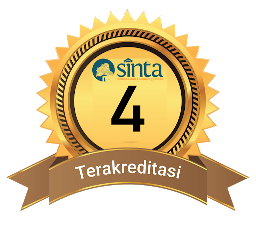Analysis of the Effectiveness of Online Chemistry Learning During the Covid-19 Pandemic at SMAN 1 Gerung
DOI:
10.29303/cep.v7i1.4544Published:
2024-05-31Issue:
Vol. 7 No. 1 (2024): Edisi Mei 2024Keywords:
Effectiveness, constraints, effort, online learningArticles
Downloads
How to Cite
Abstract
This study aims to determine the effectiveness, constraints, and efforts during chemistry learning takes place online during the Covid-19 Pandemic at SMAN 1 Gerung, West Lombok Regency. The method used in this research is descriptive qualitative. The data collected is in the form of a questionnaire filled by 72 samples. The research sample was taken by simple random sampling that has been calculated with the slovin formula. Results of data analysis the research questionnaire on all indicators produces an average value successively with less effective aspects as follows: indicators process communication 3,40 indicators management of the implementation of learning 3,20, indicators student response 3,32, indicators learning activity 3,10, and indicators outcome student learning 3,20. Online chemistry learning in the future the Covid-19 pandemic at SMAN 1 Gerung, West Lombok Regency, is still lacking effective with an average value of 3.24. Constraints during learning takes place online, namely an unstable internet connection, limited quota internet, and there are students who do not have cellphones. Efforts made to overcome obstacles, namely the teacher visits the student's house to give learning and limited face to face learning.
References
Abidin, Zainal, Adeng Hudaya, dan Dinda Anjani. 2020. Efektivitas Pembelajaran Jarak Jauh Pada Masa Pandemi Covid-19. Journal Of Education. 1(1):131-146.
Ardiyansyah, Asman, Eka Junaidi, dan Saprizal Hadisaputra. 2019. Pengaruh Penerapan Model Pembelajaran Kooperatif Tipe Student Team Achievement Division (STAD) Berbantuan Lembar Kerja Siswa (LKS) Terhadap Hasil Belajar Kimia. Journal Chemistry Education Practice. 2(2):44-49.
Herliandry, LD, Nurhasanah, N., Suban , ME, & Kuswanto, H. 2020. Pembelajaran Pada Masa Pandemi Covid-19 . JTP - Jurnal Teknologi Pendidikan. 22 (1), 65-70.
Hapsari, Theresia Pinaka Ratna Ning dan Ade Sapri Fitria. 2020. Efektivitas pembelajaran Daring Mata Kuliah Evaluasi Pengajaran Bahasa dan Sastra Indonesia Masa Pandemi Covid-19. Jurnal Ilmiah SEMANTIKA. 2(1):11-20.
Hsb, Putri Rizkika Ramadani dan Asep Wahyu Nugraha. 2022. Pengaruh Penerapan Remedial Terhadap Hasil Belajar SiswaKelas XI pada Mata Pelajaran Kimia. Jurnal Ilmiah Pendidikan. 1(3):243-256.
Lawiah. 2022. Peningkatan Kemampuan Guru Membuat Media Pembelajaran Dalam Kegiatan Proses Belajar Mengajar Sekolah Dasar Negeri Murung Paken Tahun 2020. Jurnal Mitra Pendidikan (JMP Online). 6(2):92-101.
Maulana, Muh Abdillah. 2021. Efektivitas Pembelajaran Daring Siswa Kelas X IPA Terhadap Hasil Belajar Biologi Pada Konsep Biodiversitas. Jurnal Riset dan Inovasi Pembelajaran. 1(1):85-95.
Mawaddah, Dinda Indah. 2020. Efektivitas Model Pembelajaran Daring pada Masa Pandemi Covid-19 Terhadap Hasil Belajar Matematika. Skripsi. Keguruan dan Ilmu Pendidikan: Universitas Pancasakti Tegal.
Nguyen, Tuan. 2015. Efektivitas Pembelajaran Online: Di luar Perbedaan yang Signifikan dan Cakrawala Masa Depan. Jurnal MERLOT Pembelajaran dan Pengajaran Online. 11(2):309-319.
Saputra, Efan. 2021. Analisis Keefektifan Pembelajaran Kimia Secara Daring Pada Masa Pandemi Covid-19 di SMA Negeri Se Kecamatan Teluk Dalam. Skripsi. Banda Aceh: Universitas Islam Negeri Ar-Raniry Darussalam.
Sarah, Rahma. 2021. Efektivitas Pembelajaran Pendidikan Agama Islam Secara Daring di Masa Pandemi Covid-19 di SMKN 1 Al-Mubarkeya Ingin Jaya Aceh Besar. Skripsi. Banda Aceh: Universitas Islam Negeri Ar-Raniry Darussalam.
Widiyani, Dita Tri, Dr. Fitri Amilia, M.Pd., dan Agus Milu Susetyo, M.Pd. 2021. Indikator Pembelajaran Efektif Dalam Pembelajaran Daring (dalam jaringan) Pada Masa Pandemi Covid-19 di SMAN 2 Bondowoso (Doctoral dissertation, Universities Muhammadiyah Jember).
Author Biographies
Anjelina Erfanny, Universitas Mataram
Mukhtar Haris, Program Studi Pendidikan Kimia, Universitas Mataram. Mataram, Indonesia
Saprizal Hadisaputra, Program Studi Pendidikan Kimia, Universitas Mataram. Mataram, Indonesia
Eka Junaidi, Program Studi Pendidikan Kimia, Universitas Mataram. Mataram, Indonesia
License
Copyright (c) 2024 Anjelina Erfanny, Mukhtar Haris, Saprizal Hadisaputra, Eka Junaidi

This work is licensed under a Creative Commons Attribution-ShareAlike 4.0 International License.
Authors who publish with Chemistry Education Practice agree to the following terms:
- Authors retain copyright and grant the journal right of first publication with the work simultaneously licensed under a Creative Commons Attribution License 4.0 International License (CC-BY-SA License). This license allows authors to use all articles, data sets, graphics, and appendices in data mining applications, search engines, web sites, blogs, and other platforms by providing an appropriate reference. The journal allows the author(s) to hold the copyright without restrictions and will retain publishing rights without restrictions.
- Authors are able to enter into separate, additional contractual arrangements for the non-exclusive distribution of the journal's published version of the work (e.g., post it to an institutional repository or publish it in a book), with an acknowledgement of its initial publication in Chemistry Education Practice.
- Authors are permitted and encouraged to post their work online (e.g., in institutional repositories or on their website) prior to and during the submission process, as it can lead to productive exchanges, as well as earlier and greater citation of published work (See The Effect of Open Access).






